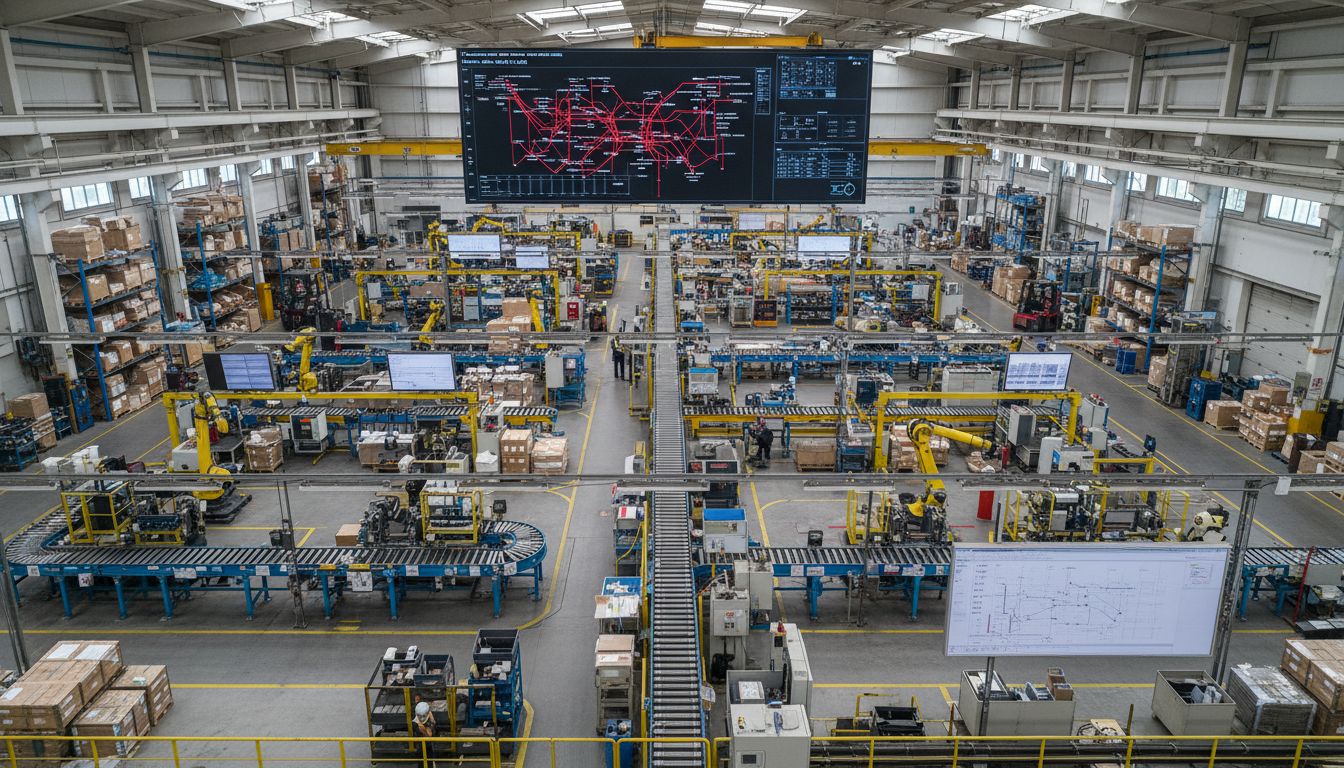Understanding the Role of AI in Decision Making

Artificial Intelligence is reshaping how big decisions get made in business and beyond. Most people picture robots or sci-fi, but the reality is much more practical. AI-powered tools can analyze massive data sets and spot patterns no human could ever notice, sometimes making choices with accuracy levels above 90 percent. But here is where things take a sharp turn. The smartest companies are not handing over the reins to machines alone. They are creating a partnership where technology and human judgment work together, flipping the old script on what it means to make a smart decision.
Table of Contents
- What Is AI And Its Role In Decision Making?
- Why AI Matters In Business Decisions
- How AI Analyzes Data For Better Choices
- Key Concepts Of AI In Decision Making
- Real-World Examples Of AI-Driven Decisions
Quick Summary
| Takeaway | Explanation |
|---|---|
| AI enhances decision making | AI provides data-driven insights that improve strategic choices in business. |
| Humans are central to AI design | Successful AI implementation enhances human intelligence rather than replacing it. |
| Mitigates human bias | AI reduces cognitive biases, leading to more objective decision making. |
| Enables predictive analysis | Machine learning uncovers trends and predicts outcomes, optimizing strategies. |
| Facilitates competitive advantages | Businesses can leverage AI to quickly identify market opportunities and manage risks. |
What is AI and Its Role in Decision Making?
Artificial Intelligence represents a transformative technological approach where computer systems simulate human-like intelligence, enabling complex problem solving and decision making beyond traditional computational methods. At its core, AI empowers businesses to analyze massive datasets, recognize intricate patterns, and generate insights that support strategic choices.
Understanding AI’s Fundamental Mechanism
AI functions through sophisticated algorithms and machine learning models that process information differently from traditional software. Unlike standard computer programs following rigid instructions, AI systems can learn from data, adapt their responses, and improve performance over time. These systems leverage various techniques including:
- Neural networks that mimic human brain processing
- Statistical modeling for predictive analysis
- Natural language processing for understanding context
By continuously analyzing and interpreting data inputs, AI can generate recommendations that go beyond simple calculations, providing nuanced strategic guidance for business leaders.
AI Decision Making in Business Context
In practical business scenarios, AI transforms decision making by offering objective, data driven insights. According to research from Harvard’s Digital Data Design Institute, generative AI technologies can evaluate complex scenarios with remarkable consistency, particularly when assessing early-stage innovations or intricate strategic challenges.
However, the most powerful AI implementations recognize that technology should augment human intelligence, not replace it. At Average Robot, we emphasize that humans must remain central to AI design and implementation. Our approach ensures AI becomes a strategic tool that amplifies human expertise rather than an autonomous decision maker.
By treating AI as a collaborative partner, business owners can leverage advanced computational capabilities while maintaining critical human judgment and contextual understanding.
Below is a comparison of how AI and human intelligence contribute to decision making in a business context, highlighting strengths, limitations, and their best application scenarios.
| Aspect | AI Contribution | Human Contribution |
|---|---|---|
| Data Processing | Analyzes massive datasets rapidly | Limited to manageable data sets |
| Pattern Recognition | Identifies complex, non-obvious patterns | Relies on experience, may miss subtle trends |
| Adaptability | Learns and adapts with new data inputs | Adapts through reasoning and context |
| Bias Reduction | Reduces cognitive biases via objective analysis | Susceptible to personal and cognitive biases |
| Context & Creativity | Limited contextual understanding, lacks creativity | Excellent at applying context, creativity, and judgment |
| Ideal Use Case | Repetitive, data-heavy, predictive tasks | Strategic, nuanced decisions requiring judgment |
Why AI Matters in Business Decisions
In an increasingly competitive business landscape, AI has emerged as a critical tool for organizations seeking strategic advantages through intelligent decision making. By transforming raw data into actionable insights, AI enables businesses to navigate complex challenges with unprecedented precision and speed.
Strategic Competitive Advantage
AI delivers competitive advantages by processing information at scales and speeds impossible for human teams. Businesses leveraging AI can make faster, more informed decisions that anticipate market trends and customer needs. This capability allows companies to:
- Identify emerging market opportunities quickly
- Predict potential risks before they escalate
- Optimize resource allocation with data driven strategies
Unlike traditional analytical methods, AI can simultaneously analyze multiple data streams, detecting subtle correlations that human analysts might overlook. This comprehensive approach provides a more holistic understanding of business dynamics.
Reducing Human Bias in Decision Making
According to research from MIT Sloan Management Review, AI technologies offer a significant opportunity to minimize cognitive biases that often cloud human judgment. By relying on objective data analysis and pattern recognition, AI can help organizations make more neutral, consistent decisions across various operational domains.

However, Average Robot emphasizes that AI is not about replacing human intelligence, but augmenting it. Our approach ensures that AI serves as a strategic partner, providing insights while allowing human experts to interpret and apply those insights contextually.
The true power of AI in business decisions lies not in automation, but in creating a collaborative ecosystem where technological capabilities and human expertise work synergistically. By integrating AI thoughtfully, businesses can transform decision making from a reactive process to a proactive, intelligence driven strategy that anticipates challenges and seizes opportunities.
How AI Analyzes Data for Better Choices
AI transforms raw data into strategic insights through advanced analytical techniques that go far beyond traditional computational methods. By employing sophisticated algorithms and machine learning models, AI systems can uncover complex patterns and relationships within massive datasets that would remain invisible to human analysts.
Machine Learning Data Processing
Machine learning algorithms represent the core mechanism through which AI analyzes data. These intelligent systems can automatically identify significant patterns and trends by continuously processing and learning from incoming information. This dynamic approach allows businesses to:
- Recognize subtle correlations across different data points
- Predict potential outcomes with remarkable accuracy
- Adapt analysis strategies in real time based on new information
Unlike static reporting tools, machine learning models become more refined and precise with each additional dataset they process, creating an evolving intelligence that grows more valuable over time.
Predictive Analytics and Decision Support
According to research from Harvard University, AI’s data analysis capabilities extend beyond simple pattern recognition. These systems can construct probabilistic models that assess potential scenarios, assign likelihood metrics, and recommend optimal strategic paths.
At Average Robot, we understand that AI should enhance human decision making, not replace it. Our approach focuses on creating AI tools that provide clear, actionable insights while preserving human expertise and contextual understanding.
By integrating advanced data analysis techniques with strategic human oversight, businesses can transform complex information into meaningful, forward looking decisions. AI becomes a powerful lens through which organizations can view potential futures, anticipate challenges, and identify opportunities with unprecedented clarity and precision.
Key Concepts of AI in Decision Making
Artificial Intelligence introduces a sophisticated framework for understanding and implementing intelligent decision making processes that transcend traditional computational approaches. By integrating advanced algorithms with strategic human insight, AI creates a robust ecosystem for analyzing complex business challenges.
Fundamental AI Decision Making Principles
AI decision making is built upon core principles that transform data into actionable intelligence. These foundational concepts enable businesses to move beyond reactive strategies toward proactive, predictive approaches. The primary principles include:
- Continuous learning and adaptation
- Probabilistic reasoning and scenario analysis
- Objective data interpretation
- Transparent algorithmic processes
These principles ensure that AI systems provide nuanced, contextually relevant recommendations that support strategic business objectives while maintaining high standards of reliability and interpretability.
The table below outlines key principles of AI decision making, summarizing how each principle transforms raw data into actionable business intelligence.
| Principle | Description |
|---|---|
| Continuous Learning | AI models evolve by adapting to new data and feedback |
| Probabilistic Reasoning | Evaluates multiple scenarios using likelihoods to inform decisions |
| Objective Data Interpretation | Analyzes data without emotional or cognitive biases |
| Transparent Algorithms | Uses explainable processes to ensure accountability and trust |
| Strategic Human Oversight | Insights are reviewed and applied by human experts |
Machine Intelligence and Human Collaboration
According to research from the National Institutes of Health, successful AI implementation requires a symbiotic relationship between technological capabilities and human expertise. The most effective AI systems are designed as collaborative tools, augmenting human decision making rather than attempting to replace it entirely.
At Average Robot, we emphasize that AI should serve as an intelligent partner. Our approach focuses on creating AI solutions that provide clear insights, highlight potential opportunities and risks, and support human decision makers in making more informed choices.
By understanding these key concepts, business leaders can transform AI from a mysterious technological tool into a strategic asset. The goal is not to surrender decision making to machines, but to create a dynamic partnership where technological precision meets human creativity and contextual understanding.
Real-World Examples of AI-Driven Decisions
Artificial Intelligence has transitioned from theoretical concept to practical business tool, demonstrating remarkable capabilities across diverse industries. By transforming complex data into actionable insights, AI enables organizations to make more intelligent, precise decisions that drive significant operational improvements.
AI in Healthcare Decision Making
AI technologies are revolutionizing critical decision making processes in healthcare settings, providing unprecedented support for medical professionals. These intelligent systems can analyze medical imaging, predict patient risks, and recommend personalized treatment strategies. Key applications include:
- Diagnostic image analysis and early disease detection
- Patient risk assessment and preventative care planning
- Medical resource allocation optimization
By processing vast amounts of medical data rapidly, AI helps healthcare providers make more accurate, timely decisions that potentially save lives and improve patient outcomes.

Business Strategy and Operational Optimization
According to the U.S. Food and Drug Administration, AI decision making extends far beyond healthcare. Businesses across manufacturing, finance, and technology sectors are leveraging AI to:
Identify market trends with greater precision Optimize supply chain logistics Personalize customer engagement strategies
At Average Robot, we understand that AI is most powerful when it augments human expertise. Our approach focuses on creating AI tools that provide clear insights while preserving strategic human judgment. By treating AI as a collaborative partner, businesses can transform complex data into meaningful, forward looking decisions that drive competitive advantage.
Turn AI Decision Making into Your Competitive Advantage
Reading about AI’s role in business decision making may leave you wondering how to actually apply these insights to your own company. The article explained that while AI can process complex data and reduce human bias, it still requires strategic direction and human judgment to be fully effective. Many business owners struggle to bridge this gap, facing overwhelming complexity and competing priorities when introducing AI into day-to-day decision making. You do not have to navigate this transformation alone.

Partner with Average Robot to move from AI theory to real impact. Let our experts build your custom AI roadmap, designed specifically for mid-sized businesses ready to automate tasks, boost morale, and increase valuation. We give you the step-by-step support, proven playbooks, and team training you need to make AI work for your goals. Visit Average Robot’s homepage now to start transforming data into smarter business decisions today.
Frequently Asked Questions
What is AI, and how does it help in decision making?
AI, or Artificial Intelligence, involves computer systems simulating human-like intelligence to analyze large datasets, recognize patterns, and generate insights that support strategic decision making. AI enhances decision making by providing data-driven insights that can lead to more informed choices.
How does machine learning contribute to AI decision making?
Machine learning is a core part of AI that allows systems to automatically identify patterns and trends in data by continuously learning from new information. This enables businesses to make accurate predictions and adapt to changing conditions in real time.
Can AI help reduce biases in decision making?
Yes, AI can reduce human cognitive biases by relying on objective data analysis rather than personal judgment. This helps organizations achieve more neutral and consistent decisions across various operational domains.
What are some real-world applications of AI in decision making?
AI is widely used in various industries, such as healthcare for diagnostic analysis and risk assessment, as well as in business for market trend identification and supply chain optimization. These applications allow organizations to make precise and informed decisions that enhance operational efficiency.




